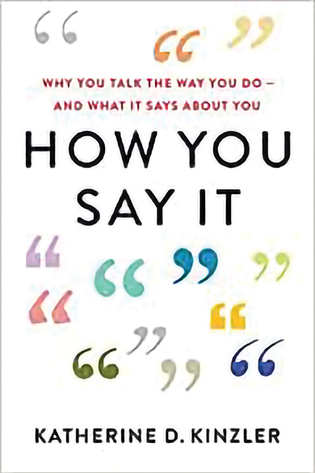
How You Say It: Why You Talk the Way You Do—And What It Says About You
Katherine D. Kinzler ’03
Houghton Mifflin
Harcourt, $28
Reviewed by Alex Beam ’75
It’s not what you say, University of Chicago psychology professor Katherine Kinzler ’03 argues in her new book, but How You Say It. In lapidary prose buttressed by fascinating examples from linguistic experiments, Kinzler convincingly argues that outward manifestations of speech such as accent and dialect often contain more information—and more potential for prejudice—than the statements people make.
Women and men modulate how they speak for complicated reasons, Kinzler demonstrates. Linguists have parsed Supreme Court justice Ruth Bader Ginsburg’s speech tones from recordings made when she pled before the Court as a litigant, and when she later spoke from the bench. A Brooklyn native, Ginsburg only allowed “her former New York vocal features” free rein after she ascended to the Court. Previously, as “a young female lawyer [with] a lot to prove,” Kinzler writes, “she may have carefully monitored her accent to sound as neutral as possible.” This is called “linguistic sway,” which is “mostly unintentional and unconscious.”
Speech, of course, can divide us, but Kinzler argues that it doesn’t have to. An ardent proponent of bilingualism—she has raised her daughter to speak French and English—Kinzler believes, and evidence shows, that speaking another language is the proverbial stroll in another person’s footwear. More formally known as “linguistic transfer,” it has been observed that “by speaking a new language, you—perhaps somewhat mystically—take on the psychic properties of people who speak that language.” Bilingual children seem to be “particularly good at understanding others’ mental states—thinking carefully about what other people know and don’t know.”
In George Bernard Shaw’s play Pygmalion, language professor Henry Higgins remarks that “it is impossible for an Englishman to open his mouth without making some other Englishman hate or despise him.” But it doesn’t have to be that way, Kinzler argues. A little empathy and understanding can go a long way toward bridging the linguistic divide. “My hope is that by becoming alert to the many ways in which our speech affects those around us,” she writes, “we can better match our language to our personal ideals.”
Alex Beam ’75 is the author of Broken Glass, a book about Mies van der Rohe’s Farnsworth House.
 loading
loading